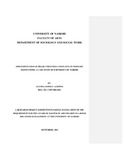| dc.description.abstract | Trade union education plays a key role in strengthening TUs by focusing on challenges facing
the labour movement. Its underlying principle is that high quality education is not only a right
that should be accorded to trade unionists but also a necessary prerequisite for building strong,
independent and democratic TU movement in the country. However, concerns have been raised
over the educational activities of TUs and whether their implementation is a reality despite the
fact that the current TUs are weak, non independent, un-democratic, and industrial relations in
the country is poor. In fact, trade unionism is seen by some to be in terminal decline and no
longer relevant to an advanced society, with calls for alternatives to TUs. Despite training being
one of the union’s mandate, most unions do little to execute it. In that regard, this research
sought to assess the implementation of TUE in Tertiary Institutions using UoN as a case study.
Specifically, the study investigated the level of awareness of the trade unionists on TUE,
perceptions held by Trade Unionists towards TUE and challenges facing the implementation of
TUE programs. The study adopted a descriptive survey research design whose target population
comprised of 1,201 union members and 18 union officials from CAVS and CPBS at UoN. The
study purposively sampled 12 TU officials and 120 TU members using systematic random
sampling method. Data was collected using questionnaires and analyzed both thematically and
descriptively using MS Excel and Statistical Package for Social Sciences (SPSS). Findings
indicated low levels of awareness on TUE which is an indication of lack of TUE programs. The
study found positive perceptions towards TUE with some elements of negative perceptions
which could be due to lack of awareness. The reported TUE implementation challenges were:
corruption in the labour movement, poor style of union management, lack of training
opportunities and training policies. The overall conclusion of the study was that there is lack of
TUE and that what unionists refer to as TUE are ‘kamukunji’ meetings which do not have the
characteristics of TUE. It was clear from the responses that TUE at the UoN was low/inadequate
and that some unions did not have them at all. This study therefore recommends that union
officials need to take TUE matters seriously by organizing and attending trainings instead of
consistently complaining about low attendance of meetings without employing remedial
measures. They should involve members in the development of TUE programs and take
advantage of free TUE programs such as the study cycle program. That effective TUE would
serve as a major vehicle for TUs to justify and sustain their existence so as to improve industrial
relations in the country. | en_US |

